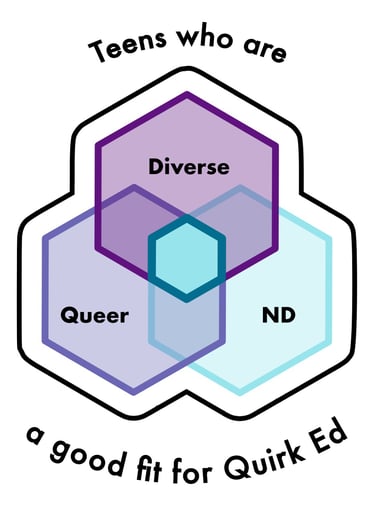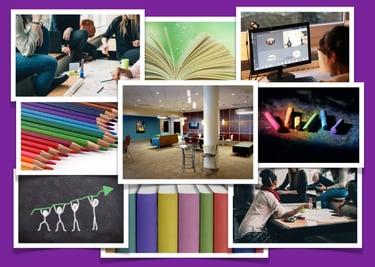Mission
This is who Quirk Ed was built for, but any quirky learners are welcome!
We cater to the diverse, queer, and neurodivergent learners who do not fit well in a traditional classroom, or who feel unsafe at a public school in the present political climate.
We build on niche interests and use a variety of engaging methods to provide the unique education your learner needs.
Quiz:


Who
A microschool is a small, independent learning center, typically built around a unique learning model or niche population. The microschool movement is growing across the country as families look for a meaningful educational experience for their learners.
Quirk Ed’s focus is on creating an educational community for learners who do not fit well in a traditional classroom. It could be that their needs are not being met, they feel overwhelmed, or they do not feel welcome in light of the current administration and its policies.
Quirk Ed uses a reduced schedule and home/microschool split to help every learner thrive. Learners can work on core subjects at home through curriculum or learning plans we create. Learners will have two virtual days per week for community and workshops. Local learners will have one optional on site day. Learner or Learner/Family meetings as needed. Small group body doubling sessions as needed. This approach ensures every learner gets the support they need and has a school/life balance that allows them to pursue their passions.
For more information on microschools in general, visit KaiPod Learning
Quirk Ed is currently offering two programs for teens:
Empowerment Community and Homeschool Oversight
What


By Westlake Commons
Westlake Village 91361
Exact location upon enrollment
Where
Educational Year: September 2nd 2025 to June 12th 2026
Empowerment Community: Tuesdays and Thursdays
When
Sometimes life gives us key defining moments. They are not always what we would think.
Why
“The kids may hate it, but I get all of them reading on level by the end of the school year.”
- my child’s kindergarten teacher


This is as far from my educational philosophy as you can get.
Pretty sure I gaped like a goldfish while trying to decide how to respond. At home, I was seeing my child’s love of learning, and love of reading in particular, decline alarmingly. What good is teaching kids to read if they hate it? Why was this teacher so quick to destroy students’ intrinsic motivation? Is there any difference in achievement, success, or more importantly, quality of life among adults who learned to read at 5 years old vs 7? Is this really the battle we want to fight?
When we talk about education, what do we mean?
School is easy to define. A school is a building, with classrooms. Classrooms have desks and chairs and a board for lessons. Once a year, students across the country sit down to take the same test, at the same time, to demonstrate they are getting the same information. Legislators say these tests are necessary to measure progress. Administrators say these tests are necessary to appease legislators. Teachers say these tests are problematic. Students hate them. And if today’s students are anything like me as a child, they forget the factoids they diligently memorized the moment their feet next hit the playground.
I hesitate to call that education.
I want education to engage, enlighten, and inspire. I expect education to give learners the tools they will need to be competent members of their community. Learners need critical thinking skills, research skills, comprehension, and self-expression. They need to know how to solve problems and where to go for help. They need confidence and security.
Those are certainly things that could be taught in public schools. They have the infrastructure, and they absolutely have dedicated and hard-working teachers. What they don’t have is the freedom. We tie teachers' hands, hold them to unachievable standards, pay them a pittance, and wonder why teacher retention is such a problem. I recently attended a webinar of school administrators looking to hire teachers; commiserating about how hard it was to find talented people. This mystery was solved (for me, anyway) when someone brought up salary.
“As long as you pay them more than Uber, they should be happy getting to do what they love.”
Again, I gaped like a goldfish. We cannot expect to treat teachers this way, and get their best work.
We cannot expect to treat learners this way, and provide a meaningful educational experience.
We can do better. Our learners deserve better.


